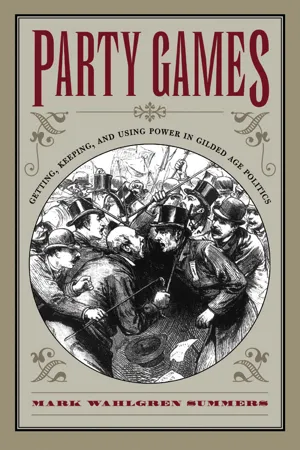
Party Games
Getting, Keeping, and Using Power in Gilded Age Politics
- 368 pages
- English
- ePUB (mobile friendly)
- Available on iOS & Android
About this book
Much of late-nineteenth-century American politics was parade and pageant. Voters crowded the polls, and their votes made a real difference on policy. In Party Games, Mark Wahlgren Summers tells the full story and admires much of the political carnival, but he adds a cautionary note about the dark recesses: vote-buying, election-rigging, blackguarding, news suppression, and violence.
Summers also points out that hardball politics and third-party challenges helped make the parties more responsive. Ballyhoo did not replace government action. In order to maintain power, major parties not only rigged the system but also gave dissidents part of what they wanted. The persistence of a two-party system, Summers concludes, resulted from its adaptability, as well as its ruthlessness. Even the reform of political abuses was shaped to fit the needs of the real owners of the political system — the politicians themselves.
Frequently asked questions
- Essential is ideal for learners and professionals who enjoy exploring a wide range of subjects. Access the Essential Library with 800,000+ trusted titles and best-sellers across business, personal growth, and the humanities. Includes unlimited reading time and Standard Read Aloud voice.
- Complete: Perfect for advanced learners and researchers needing full, unrestricted access. Unlock 1.4M+ books across hundreds of subjects, including academic and specialized titles. The Complete Plan also includes advanced features like Premium Read Aloud and Research Assistant.
Please note we cannot support devices running on iOS 13 and Android 7 or earlier. Learn more about using the app.
Information
Abbreviations
| AmN | American Nonconformist |
| BWC | Bangor Whig and Courier |
| ChaN&C | Charleston News & Courier |
| ChanMSS (LC) | William E. Chandler MSS, Library of Congress, Washington |
| ChanMSS (NHHS) | William E. Chandler MSS, New Hampshire Historical Society, Concord |
| ChiTi | Chicago Times |
| ChiTr | Chicago Tribune |
| CinCG | Cincinnati Commercial Gazette |
| CinEnq | Cincinnati Enquirer |
| CinGaz | Cincinnati Gazette |
| ClPD | Cleveland Plain Dealer |
| CMMHC | Calvin M. McClung Historical Collection, Knox County Public Library System, Knoxville |
| ConMon | Concord Daily Monitor |
| CR | Congressional Record |
| DEN | Detroit Evening News |
| DMSR | Des Moines Iowa State Register |
| HML | Rutherford B. Hayes Memorial Library, Fremont, Ohio |
| HW | Harper’s Weekly |
| InJ | Indianapolis Journal |
| InN | Indianapolis News |
| InSen | Indianapolis Daily Sentinel |
| ISHS | Illinois State Historical Society, Springfield |
| IW&AIL | Irish World and American Industrial Liberator |
| JSP | John Swinton’s Paper |
| KoL | Knights of Labor |
| LC | Library of Congress, Washington |
| LC-J | Louisville Courier-Journal |
| LRArkG | Little Rock Arkansas Gazette |
| ManU | Manchester Daily Union |
| MHS | Minnesota Historical Society, St. Paul |
| NAR | North American Review |
| NOrT-D | New Orleans Times-Democrat |
| NYEP | New York Evening Post |
| NYH | New York Herald |
| NYS | New York Sun |
| NYSL | New York State Library, Albany |
| NYStan | New York Standard |
| NYT | New York Times |
| NYTr | New York Tribune |
| NYW | New York World |
| ODB | Omaha Daily Bee |
| PhilRec | Philadelphia Record |
| PiPo | Pittsburgh Post |
| RanMSS | Samuel J. Randall MSS, Rare Book and Manuscript Library, University of Pennsylvania, Philadelphia |
| RJ | Racine Journal |
| SFAltaC | San Francisco Alta California |
| SHSW | State Historical Society of Wisconsin, Madison |
| SprRep | Springfield Republican |
| StLG-D | St. Louis Globe-Democrat |
| StLP-D | St. Louis Post-Dispatch |
| StPGW | St. Paul Great West |
| StPP-P | St. Paul Daily Pioneer-Press |
| SU | Stanford University, Palo Alto |
| WilEvEv | Wilmington Every Evening |
| WVC | West Virginia Collection, West Virginia University Library, Morganton |
Preface
Chapter One
Table of contents
- Title Page
- Copyright Page
- Table of Contents
- PREFACE
- I - Our Friend the Enemy
- II - Party Tricks
- III - Policy — The Golden Rule?
- IV - Rounding off the Two and a Half Party System
- CODA
- NOTES
- BIBLIOGRAPHY